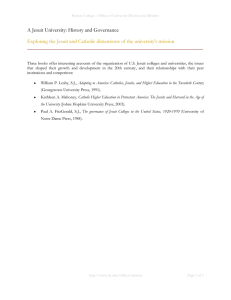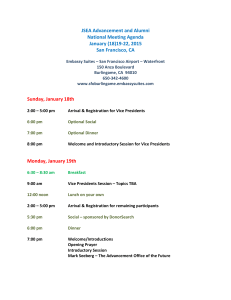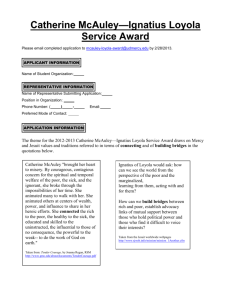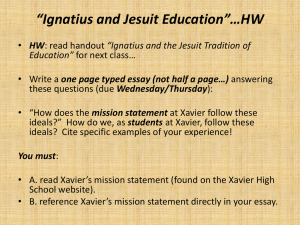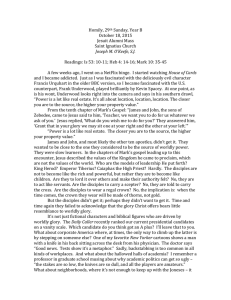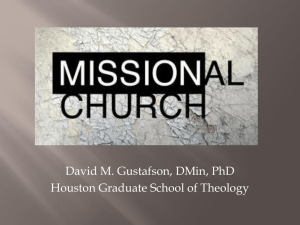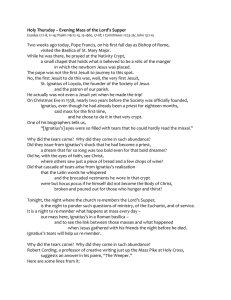“The Experience of Ignatius Loyola: Background to Jesuit Education”
advertisement
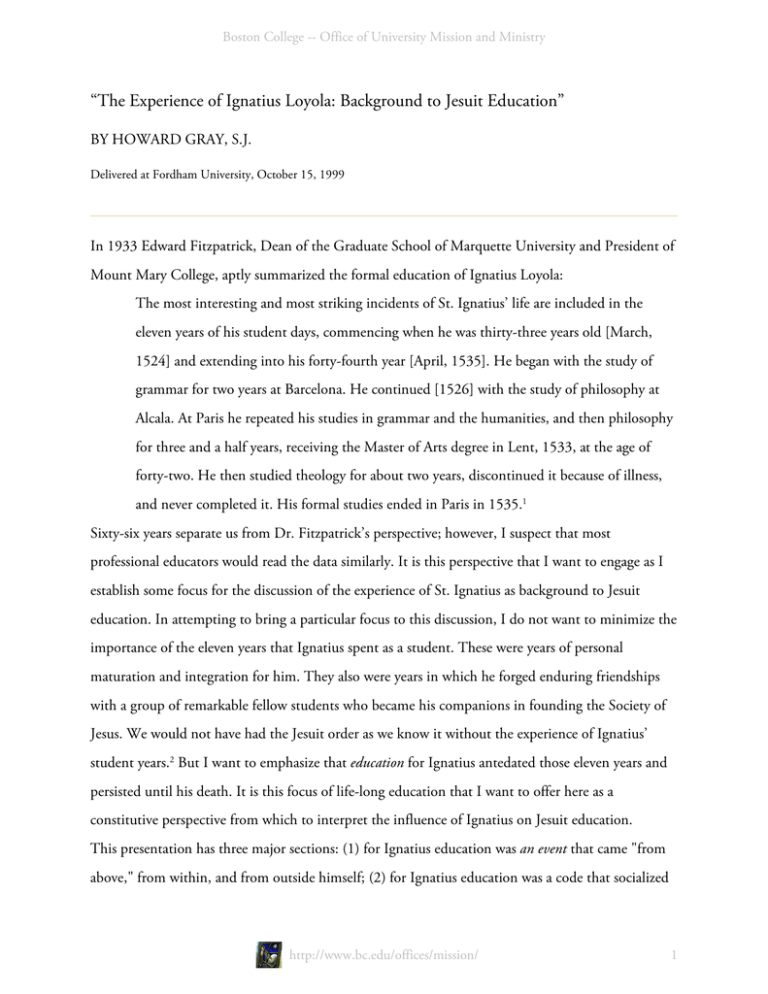
Boston College -- Office of University Mission and Ministry “The Experience of Ignatius Loyola: Background to Jesuit Education” BY HOWARD GRAY, S.J. Delivered at Fordham University, October 15, 1999 In 1933 Edward Fitzpatrick, Dean of the Graduate School of Marquette University and President of Mount Mary College, aptly summarized the formal education of Ignatius Loyola: The most interesting and most striking incidents of St. Ignatius’ life are included in the eleven years of his student days, commencing when he was thirty-three years old [March, 1524] and extending into his forty-fourth year [April, 1535]. He began with the study of grammar for two years at Barcelona. He continued [1526] with the study of philosophy at Alcala. At Paris he repeated his studies in grammar and the humanities, and then philosophy for three and a half years, receiving the Master of Arts degree in Lent, 1533, at the age of forty-two. He then studied theology for about two years, discontinued it because of illness, and never completed it. His formal studies ended in Paris in 1535.1 Sixty-six years separate us from Dr. Fitzpatrick’s perspective; however, I suspect that most professional educators would read the data similarly. It is this perspective that I want to engage as I establish some focus for the discussion of the experience of St. Ignatius as background to Jesuit education. In attempting to bring a particular focus to this discussion, I do not want to minimize the importance of the eleven years that Ignatius spent as a student. These were years of personal maturation and integration for him. They also were years in which he forged enduring friendships with a group of remarkable fellow students who became his companions in founding the Society of Jesus. We would not have had the Jesuit order as we know it without the experience of Ignatius’ student years.2 But I want to emphasize that education for Ignatius antedated those eleven years and persisted until his death. It is this focus of life-long education that I want to offer here as a constitutive perspective from which to interpret the influence of Ignatius on Jesuit education. This presentation has three major sections: (1) for Ignatius education was an event that came "from above," from within, and from outside himself; (2) for Ignatius education was a code that socialized http://www.bc.edu/offices/mission/ 1 Boston College -- Office of University Mission and Ministry his experiences so that others could share these, and (3) for Ignatius education was an apostolic enterprise that would have an impact on both the Church and civil society. I shall conclude with some exploratory reflections on what this might mean for Jesuit education today. 1. Education as an event. In his dictated memoir, Ignatius summarizes an important aspect of his time at Manresa in these words: During this period God was dealing with him in the same way a schoolteacher deals with a child while instructing him. This was because either he was thick and dull of brain, or because of the firm will that God Himself had implanted in him to serve Him - but he clearly recognized and has always recognized that it was in this way that God dealt with him. Furthermore, if he were to doubt this, he would think he was offending the Divine Majesty.3 Ignatius then cites five extraordinary instances of divine tutelage, climaxing in the pivotal illumination at the River Cardoner. Of this extraordinary divine intervention, Ignatius says: He cannot expound in detail what he then understood, for they were many things, but he can say that he received such a lucidity in understanding that during the course of his entire life -- now having passed his sixty-second year -- if he were to gather all the help he received from God and everything he knew, and add them together, he does not think they would add up to all he had received on that occasion.4 Ignatius’ account of his transformation strikes me as important not only because it represents a moral conversion but an intellectual reorientation, a way of viewing God as inspiration and the world as a source of knowledge. Moreover, the primitive exercise of discernment initiated at Loyola was becoming at Manresa a habit of heart. This graced intervention was a communication not merely about the things of God but of God Himself. Later, Ignatius struggled to articulate what this relationship meant, especially as he began to see that the process was one he could share with others. The God of revelation was a God who communicated in order to lead men and women to decisions about how they would live their lives, employ their talents, and direct their resources. Consequently, from this Manresa experience, Ignatius was to lay down an essential principle in the Spiritual Exercises: http://www.bc.edu/offices/mission/ 2 Boston College -- Office of University Mission and Ministry [D]uring these Spiritual Exercises when a person is seeking God’s will, it is more appropriate and far better that the Creator and Lord Himself should communicate himself to the devout soul, embracing it in love and praise, and disposing it for the way which enable the soul to serve him better in the future. Accordingly, the one giving the Exercises ought not to lean or incline in either direction but rather, while standing by like a pointer of a scale in equilibrium, to allow the Creator to deal immediately with the creature and the creature with its Creator and Lord.5 In other words, out of his own experience of divine intervention, Ignatius came to understand the universality of God’s desire to communicate personally with men and women, to engage their histories with a new interpretation, to reorient their imaginations with new possibilities, and to redirect their talents and opportunities towards new enterprises. He was to term this divine intervention de arriba, a gift not only of understanding God’s descent into the human but of the human ability to rise to God from created reality.6 It is this graced ability that became for Ignatius the habit of finding God in all things. As Hugo Rahner explains: From then [Manresa] on, his theological thought became a descending movement from God to creatures, in which created things and all earthly beauty, wisdom and righteousness were merely reflected splendour of what he had already grasped in the immediacy of his mystical contemplation of God Himself.7 But the privileged particularly of his illuminations did not inhibit Ignatius from constructing a system of prayer and reflection that would invite other men and women of good will to find how God could also enter their lives, de arriba, from above, and how this grace would enable them, too, to find God in all things. Thus, inherent first in the Manresa experiences and then in the processes he proposed to others through the Exercises was the reverence Ignatius had for teaching and learning as metaphors for God’s way in guiding human decisions.8 There are important consequences for the way God instructs. If the divine can enter into human consciousness and reorient a life, then people can trust the effect this has within them. The gift from above becomes a gift within the human reality of the person. Indeed, the revelation of God to a man or woman demands personal appropriation. It is personal history which is reinterpreted, personal http://www.bc.edu/offices/mission/ 3 Boston College -- Office of University Mission and Ministry imagination that accepts new possibilities, and personal talents and opportunities that accept new enterprises. The Ignatian idea of an election, i.e., the choice that emerges out of the process of the Exercises, is not that of imposition but of mutual acceptance, human and divine. It is not just piety that prompts the Ignatian insistence that a colloquy conclude the prayer of the Exercises. This intimate conversation between a man or a woman and God is sacred because here is a privileged moment of mutual trust.9 Ignatius learned to trust his heart as a place of unique encounter with God. In that experience he also learned to trust the hearts of others as places for similar encounters. This movement represents a complex set of confidences: in one’s own interiority, in the goodness of God, in the ability of others to find God too. From the opening of the Exercises -- which encourages both the one who gives the Exercises and the one who makes them to trust one another throughout the process10 -- to the intense conclusion of the Exercises -- in which the one who is making them holds the entire experience as an act of divine love, human acceptance, and mutual surrender11 -- trust is the glue that holds this spiritual education together. Trust is an essential component in Ignatian spirituality. Trust, in turn, will permeate the life and mission of the Society of Jesus. Trust will characterize the way Jesuits deal with people, cultures, and other religious experiences. For if Ignatius saw God as one who taught, he also saw God as one who taught out of trust for the unique reality of his own [Ignatius’] temperament, history, and talents. God for Ignatius was an adapting God, a God who met created reality in trust. From God’s trust Ignatius learned to trust -- himself first and others later.12 This Ignatian trust of other created reality -- other people, cultures, religions, experiences -- founds why he can speak of finding God in all things and explains both the location and significance of the Contemplation To Attain Divine Love at the close of the Exercises. If one lives with God, then, one can find God’s truth within life, God’s direction within created energy, God’s love dwelling deeply within creation. For Ignatius sin is the absence of God and uncovered in falsehood and deceit, in reckless ambition and oppression, in enmity, bias, and indifference to human anguish.13The Manresa experience did not exhaust Ignatius’ education in divine wisdom. His subsequent years of study and then his governance over the young Society of Jesus contributed their own enrichments. But http://www.bc.edu/offices/mission/ 4 Boston College -- Office of University Mission and Ministry Manresa symbolizes the foundation of Ignatian education. It was an event that was experiential; it was based on trust; and it invited a discovery of God in a variety of created realities. Consequently, when we emphasize, as we should, the importance of adaptation in the Spiritual Exercises, we are reflecting what Ignatius discovered at Manresa about God. God adapts to the human to teach truth, to encourage our trust in our experiences, and to enrich the ways in which all creation can become a revelation about God’s presence and action. Manresa was an event in divine tutelage for Ignatius, revealing how he was to help others to respond to that tutelage in their lives.14 How was this help to be accomplished? 2. Codification of the Experience. Ignatius learned early the value of bringing inspiration into a system.15 The Spiritual Exercises are an ordered set of instructions integrating the freedom necessary to any genuinely Christian religious experience with the guarantees that insure that the experience is both authentically from God and respectful of human reason and dignity.16 While these dual concerns are woven throughout the Exercises, Ignatius presents them most systematically in the twenty introductory reflections that he presents as aids to the one who gives the Exercises. These instructions fall under three general headings: about prayer, about discernment, and about choices. For example, when Ignatius gives suggestions about how prayer should be presented within the experience of the Exercises, he clearly expects the one who leads this experience to give instructions.17 However, he also cautions that these instructions are to be brief in order to allow the one who makes the prayer the freedom to discover for himself or herself whatever God chooses to reveal.18 To use another example, Ignatius lays out careful guidelines to help the one giving the Exercises to assess the movements of spirit that inevitably arise within the experience of the Exercises.19 But he is equally solicitous that this instruction gradually empower the one making the Exercises to develop his or her own ability to distinguish what is from God and what is not from God, what is enduringly good from what is only an apparent good.20 As a final example, while Ignatius relentlessly places before the one making the Exercises the ideals of the gospel, Ignatius is equally careful to insure that any personal choice that the one making the Exercises embraces be done with freedom from bias, prejudices, or outside influences.21 http://www.bc.edu/offices/mission/ 5 Boston College -- Office of University Mission and Ministry The Spiritual Exercises emerged out of Ignatius’ stay at Manresa and then were refined over a number of years.22 Ignatius viewed them as a way to help others find peace and direction in their lives out of the inspiration of the gospels. They were never intended to be coercive or insinuating. Rather, they were designed for people of maturity, freedom and openness of heart who would be willing to consider how they could live lives of more profound dedication and generous service of others. To that end, Ignatius insisted on a certain solitude of soul, a separation from distractions, a willingness to take time to pray and to reflect, and a docility of heart to someone who would guide this experience. At the same time he cautioned the instructor of the Exercises to adapt them to the temperament, age, and experience of each person. As a document of Christian formation, the Exercises teach. As the initial codification of Ignatian principles of instruction, the Exercises establish important guidelines for Jesuit teaching. While I have painted with a broad brush, the design of Ignatian instruction is clear. An ordered, humane approach to God’s revelation presumes the freedom to find God for oneself but within a communal revelation. Moreover, the Exercises insist on a person’s willingness to test personal experience in order to choose what will be an enduring commitment to what will most direct one to God.23 While the Exercises have sometimes been criticized as being too individualistic, they are, in fact, relentlessly oriented towards the life one lives outside their solitude in the arena of public life, to the future. For example, the Ignatian view of Christ is that of Christ on mission-- preaching, teaching, healing.24 The decision to follow Christ is to follow him as humble, poor, and rejected within a culture that values wealth, power, influence, and prestige.25 The virtues Ignatius emphasizes are those of freedom, magnanimity, and self- sacrifice which lead to doing great deeds in the world but for the sake of the gospel. Consequently, as an educational tool, the Exercises were and remain a remarkable instrument of engagement with the world and culture of one’s times. The second significant area of codification which I shall emphasize is the Constitutions of the Society of Jesus.26 Pope Paul III approved the Society of Jesus in 1540; and on April 8, 1541, Ignatius was elected its first general superior. Ignatius was then fifty years of age and dedicated the remainder of his life to the direction of this new order. As general superior, one of his chief responsibilities was to http://www.bc.edu/offices/mission/ 6 Boston College -- Office of University Mission and Ministry give oversight to the writing of Constitutions which would express the aims and means that identify the life and work of the Society. It is this document I want to consider now, especially as an expression of educational aims and processes within the Jesuit community. In this examination I shall center first on the principles that governed the formation of Jesuits and then on that which governed Jesuits who had completed their formation and were involved in direct ministry. There are three aspects of Jesuit formation that are crucial: the process of how to become a contemplative in action, the environment that promotes formation within the company, and the ways in which a man’s ability to live Jesuit life and to do its ministry were assessed. First, let me briefly explain this term "contemplative in action."27 As we have seen, Ignatius valued the processes which led him to find God in the events of his life. He believed that the Exercises, if made well and in their integrity, could similarly help others to find God in their lives. He asked the same of the men who would be members of the Society of Jesus. In the Constitutions Ignatius spells out what the process might be that can dispose a man to become a contemplative in action. In Part III of the Constitutions Ignatius treats the spiritual formation of young Jesuits. In a remarkable section he counsels the importance of an asceticism that brings focus to a man’s life. e.g., silence, a certain self-composure, and effort to be at peace with oneself.28 Then he lays down the following wisdom directive: In everything they [the young Jesuits] should try and desire to give the advantage to the others, esteeming them all in their hearts as better than themselves [Phil 2:3] and showing exteriorly, in an unassuming and simple religious manner, the respect and reverence befitting each one’s state. In such a manner that by observing one another they grow in devotion and praise God our Lord, whom each one should endeavor to recognize in his neighbor as in His image.29 This directive centers on three constitutive operations: constitutive of ways in which the young Jesuit can open himself to God’s presence and action within human relationships; operations as distinct ways to achieve a certain openness to this experience. The first is what I would call attention, the ability to be present to a relationship in its particularity. It stands for that presence in which one person allows another reality, here another Jesuit, to enter his awareness on his own terms.30 It is http://www.bc.edu/offices/mission/ 7 Boston College -- Office of University Mission and Ministry acceptance of the reality not an intrusion--through fear or bias or lack of concentration--on that reality. The second operation is reverence, the ability to cherish the reality that reveals itself, here the other Jesuit, in all his integrity. It represents another level of acceptance, not only allowing the reality to be present to me but accepting that reality as different from, unique in his self-expression, worthy of his own integrity.31 The third operation is actually the operation of grace. The word devotion, which denotes this third step, is precious to Ignatius. Devocion: a word which Ignatius uses with great frequency in all his works, especially his letters, Spiritual Exercises, Spiritual Diary, and Constitutions. It expressed his attitude of profound respect before God to whom he was totally dedicated in love and service, and he used it with multitudinous connotations, often mystical. In the Constitutions, . . . the word expresses the personal or communitarian pursuit of spiritual progress. . .[It was for Ignatius] “the actualization of the virtue of religion by means of an affection for God which is prompt, compliant, warmly loving, and impelled by charity. Its goal is the worship of God which is accomplished in all things and actions of oneself and one’s fellow men, since it gives worship to Him by finding and serving him in all things. . .” 32 In other words, through attention and reverence one can hope to be led to devotion, the ability to discover how God exists in another, here in another Jesuit. What Ignatius proposes as the touchstone of Jesuit formation is an asceticism that focuses a young Jesuit on the ability to be present to another reality, to hold in acceptance and a kind of awe the reality as he finds it, and out of this orientation to be sensitive to how God speaks to him through that other reality. Moreover, this kind of formation was not something to be done only within the novitiate. Rather it was to be inculcated as an abiding apostolic process that helped the Jesuit to become a man who could find God in all things like studies, like other cultures, like people weighed down by sins, like art and music and science.33 The ramifications of this formation directive are wide and rich, suggesting an important key not only to the personal religious event of finding God in all things but to the apostolic mind set of expecting to find God in all people, places, and events. For what this education in attention, reverence, and devotion invites is an apostolic consciousness, a readiness to expect God to communicate his presence and intentionality within all created reality but http://www.bc.edu/offices/mission/ 8 Boston College -- Office of University Mission and Ministry especially within human relationships. For the Jesuit, then, the world became both a place of contemplation and a source for apostolic planning.34 In that same section of the Constitutions, Part III, Ignatius also describes the formation environment in which attention, reverence, and devotion can be best exemplified and taught. It is contained in his description of the Director of Novices: It will be beneficial to have a faithful and competent person whose function is to instruct and teach the novices in regard to their interior and exterior conduct, to encourage them toward this correct deportment, to remind them of it, and to give them kindly admonition; a person whom all those who are in probation may love and to whom they may have recourse in their temptations and open themselves with confidence, hoping to receive from him in our Lord counsel and aid in everything.35 I have referred to the importance of trust in Ignatian spirituality. This description of the Jesuit Director of Novices is but one more instance of this virtue. The Director of Novices models what he teaches in his relationship to his charges. Men learn attention, reverence, and devotion best when they see it exemplified in their own formation. This is as appropriate a place as any to call attention to how often Ignatius urges the power of good example to affect apostolic fruit.36 People learn the gospel by seeing it lived out in their own regard. So, too, the Jesuit novices. By creating an environment of trust, the Jesuit Director of Novices makes the teaching about attention, reverence, and devotion credible and available. The formation of men for the work of the apostolate, a work that frequently demanded that Jesuits work alone and in places with minimum ecclesial safeguards and support systems, had to include a component which would test the resiliency and fidelity of the novice. Can this man live this apostolic life with benefit both to himself and to the people he will serve? Can he practice attention, reverence, and devotion outside the security of the novitiate? To answer these kinds of questions Ignatius introduced a revolutionary form of novitiate training called experiments. What are these and how do they operate?37 There are six novitiate experiments which "constitute the Ignatian pattern of religious development into ministerial life."38 Their aim was apostolic integration. What does this mean? The overall aim of http://www.bc.edu/offices/mission/ 9 Boston College -- Office of University Mission and Ministry the Society of Jesus was "to strive especially for the defense and propagation of the faith and for the progress of soul in Christian life and doctrine"39 and to accomplish this through a variety of ministries, chiefly centered on the word of God.40 Moreover, Ignatius envisioned a group able to work on the frontiers of the Church and even in lands and in enterprises that were not part of Christendom much less Catholicism. In other words, the work of the Jesuits demanded capability and flexibility. The novitiate (and tertianship) experiments, then, were ways to test the ability of young men to live this kind of life with benefit both to themselves and to others.41 By "apostolic integration," we mean that there is "a peculiar structure internal to the experiments, that they possess their own organic and evolving pattern, and that at their completion the novice (or tertian) has moved from an event of the deepest interiority and solitude into the ministerial life of the Society."42 In other words, there is a harmony--psychological and religious--between the way a man prays and orients his life and the kind of ministerial presence he brings to his work with other people. The six experiments ranged from the thirty-days of spiritual exercises made under the guidance of an experienced Jesuit to work in a hospital to a pilgrimage to service within the Jesuit community to teaching catechetics to the ministries of preaching and hearing confessions. These latter two experiments were reserved for priest candidates or tertians. While a detailed analysis of the religious significance of these experiments is somewhat afar from the focus of this paper, their importance as an educational tool is not. [T]here is a more profound pedagogy at work here. . . These experiments move from devotion, the ability to find God in all things, through experiences which call upon humility, abnegation, and poverty, and to engagement in the ministerial life of the Society. . .They are patterned on the life and ministry of Jesus. There must first be a profound contact with Christ our Lord, one that has been developing within the exercitant since the first events of the Exercises. Within that contact there is the experience of choice, of being sent, of being schooled with the “way Christ calls and wishes for all persons under his standard. .” The call of Christ into discipleship possesses a pattern that his life embodies. Ignatius sees this pattern in the earliest contemplations of his life. . . http://www.bc.edu/offices/mission/ 10 Boston College -- Office of University Mission and Ministry The movement of Jesus into his most profound ministry is through poverty and humiliations. The six experiments retrieve the structure of his life as the development of ministerial consciousness.43 These experiments, then, were part of the overall education of candidates into the Society of Jesus. They were part of a schooling for service. When these experiments were introduced, they contained "a great deal of daring and a considerable amount of novelty."44 But Ignatius assumed that risk because he believed that only through concrete experiences of working for God and with God could a man learn how God works in life situations. As a result of this insistence of learning by doing, the Jesuit novice or tertian came to appreciate that his vocation was genuinely founded on what he himself possessed before God. On the other hand, the superiors of the Society of Jesus came to appreciate the kinds of men who had presented themselves for the life and the ministry of the Society. This kind of formation established a climate in which Jesuits expected to learn from one another. Consequently, a pattern of mutuality in learning characterizes not only the life of candidates to the Society but the life of those who had taken final vows. To be a Jesuit is to learn from one another. In discussing the educational pattern within the life and work of formed Jesuits I am going to emphasize the idea of union in the Society of Jesus.45 For the early Jesuits union not community was the operative word. And while Ignatius centers his Constitutions on the apostolic end of the Society of Jesus, i.e., what it was meant to accomplish for the Church and other people, what sustains this ministry is union, the union between God and the members of the Society and the union between the head of the Society and his fellow Jesuits: The chief bond to cement the union of the members among themselves and with their head is, on both sides, the love of God our Lord. For when the superior and subjects are closely united to His Divine and Supreme Goodness, they will easily be united among themselves, through that same love which will descend from the Divine Goodness and spread to all other men, and particularly into the body of the Society. Thus from both sides charity will come to further this union between superiors and subjects, and in general all goodness and virtues through which one proceeds in conformity with the spirit.46 http://www.bc.edu/offices/mission/ 11 Boston College -- Office of University Mission and Ministry As Ignatius indicates, this bonding of its very nature effects a mutuality of exchange both with the divine and with the human. The question emerges, then, how was the Society to keep this bonding alive; what means does it have to dispose itself both to the love of God and the love between the members? Clearly the fundamental means is the acknowledgment of the utter gratuity of such union, a grace given by God for a man to live this kind of life. Establishing that absolute priority, Ignatius then indicates a collection of human means to sustain an openness to this gift: selectivity of members, obedience, the exclusion of members who consistently undermine the unity of the Society, the moral, religious, and apostolic leadership of the Superior General of the Society, a healthy uniformity, communication through letters.47 But the chief means is the General Congregation, a juridical assembly of world-wide Jesuit representatives, called either to elect a superior general or "for matters of greater moment."48 It is from this assembly that the Society of Jesus culls its directions for the future: its values, life style, and apostolic priorities. The rhythm of a General Congregation arises out of the willingness of the delegates to assess the data, to listen to one another, to articulate emerging common concerns and opportunities, and then to forge these into appropriate legislation or directives for future development by the Superior General. Consequently, the Congregation is primarily a learning session before it becomes a legislating session. In its spirituality and its government the Society of Jesus depends on the ability of its membership to discern, i.e., to make religiously motivated decisions about the most appropriate way to live gospel values and to put these into practical operation. Discernment is a learning process that involves the cooperation of human beings who try to relate their lives, talents, and resources to God’s priorities.49 Throughout the Ignatian Constitutions there is a respect for learning that emerges both out of the Ignatian reverence for a God who teaches through life experiences and out of a similar reverence for the ability of the human mind and heart to be taught. In tracking the experiences of Ignatius that influence Jesuit education this radical reverence for learning as a divine-human partnership cannot be exaggerated. These religious principles founded his legislation on formal education which constitutes the important fourth part of the Jesuit Constitutions. http://www.bc.edu/offices/mission/ 12 Boston College -- Office of University Mission and Ministry 3. Education as an Apostolic Enterprise. What I have attempted to isolate are those elements that influenced the educational outlook of Ignatius Loyola and, in turn, structured the educational experience of the Society of Jesus. Those elements were: • a reverence for the enduringly pedagogical character of God’s revelation • a trust that this process invited not only participation but imitation • an assumption that this process was mutually beneficial both to the one who taught as well as to the one who learned • in any learning experience the confirmation of God’s presence was the way that it led a Jesuit to recognize his ability to help people as Christ had helped people and the way that it united him to the other members of the Society of Jesus. Part IV of the Constitutions presents how Jesuits themselves were to learn within school systems and then how they were to conduct their own schools.50 This is ground which has been magisterially analyzed by Fr. George Ganss,51 and more recently expertly revisited by John O’Malley52 and Michael Buckley.53 I do not wish to re-present their work here. What I do want to underscore here is that there is a continuity between the divine pedagogy Ignatius experienced throughout his life and the emphases he offered in Part IV of the Constitutions. He adapted divine wisdom to the secular reality of education and the schools. There are seventeen chapters in Part IV of the Constitutions. Chapters one through ten are concerned with the formal education of Jesuits; chapters eleven to seventeen are concerned with the ministry of education that Jesuits carried on for others. For Jesuits the over-riding aim of formal education was to help them to learn how to help other people. Ignatius is straightforward in describing how people were to be helped: "To achieve this purpose, in addition to the example of one’s life, learning and a method of expounding it are also necessary."54 This is a rich program. Education should produce character, "the example of one’s life."55 The way that Jesuits learned was part of their mission. Their esteem for truth, their commitment to study for its own sake, their ability to succeed academically without alienating themselves from the humility and availability of the Master they followed--these were part of the educational program for Jesuits.56 This implies a great deal. The Jesuit scholastic was expected to http://www.bc.edu/offices/mission/ 13 Boston College -- Office of University Mission and Ministry integrate his formal education into the pattern of his apostolic life, to incorporate the empowerment of learning and professional competence into the availability of service to all people, the rich and the poor, the sophisticated and the simple, the young and the old. The good example that Ignatius presumes is not simply private virtue but rather a public persona that indicated a Jesuit was part of the human family he served. A Jesuit’s education was supposed to enhance his apostolic labor not his social status. Presuming this sustained commitment to psychological and apostolic availability, Ignatius underscores two educational aims, learning and a method of expounding it. His own experience in education had taught Ignatius the value of sound learning--linguistic, literary, philosophical, theological. His experience of trying to explain the ways of God to men and women taught him the crucial importance of communication. He honored the need for adaptation, but demanded a structured program that insured educated ministers capable of touching the minds and hearts of people.57 Formal education within the Society of Jesus was treated with deep reverence as an emblem of God’s providence, part of God’s plan to help people: Therefore the human or acquired means ought to be sought with diligence, especially wellgrounded and solid learning, and a method of proposing it to the people by means of sermons, lectures, and the art of dealing and conversing with men and women.58 University education undertaken for non-Jesuits "will aid toward the same end, as long as the method of procedure described in Part IV [440-509] is preserved."59 Concerning these universities, there are three points I want to stress. First, the apostolate of education for "those outside the Society"60 is a sharing in the gifts of Jesuit education. Second, Part IV clearly emphasizes that through the universities these gifts will "spread more universally through the branches taught, the number of persons attending, and the degrees that are conferred."61 Third, the hope is that such an apostolate would produce graduates "able to teach with authority elsewhere what they have learned well in these universities of the Society for the glory of God our Lord."62 In other words, the apostolate of Jesuit education is the expression of a mission that digs deeply into the traditions that identify Jesuit life and ministry. Like the giving of the Spiritual Exercises this reliance on a tradition does not mean replicating the experience of Jesuits for non-Jesuits. However, it does http://www.bc.edu/offices/mission/ 14 Boston College -- Office of University Mission and Ministry mean honoring the presence of God’s spirit in human life and liberating the dynamism of God’s healing and consecrating power in human enterprises. The authenticity of Jesuit education, then, does not rely primarily on the details of Ignatius’ life but on the vision he offered of the dignity of teaching, of the authority inherent in sound learning, and of the power of communicating well what one has learned. Finally, this vision proves its validity when, as it did for Ignatius, it empowers us to use what we are and what we have to help others. Conclusion. In describing the impact of Ignatius Loyola on his life, one writer, not a Jesuit, expresses it in these words: I have read every major biography and book about Ignatius, I have held his shoes in my hands, I have walked through his freshly restored rooms in the house next to what is now the Church of the Gesu, and I have next to me as I write this a nail that was in one of the walls. Supernatural prodigies have nothing to do with my rapt and consuming interest in him. I have simply been trying to figure out how to live my life magnificently, as Ignatius did, who sought in all his works and activities the greater glory of God.63 I like the description for two, immediate reasons. The appreciation testifies to accomplishment and to challenge. Ignatius truly did great deeds, and education was at the heart of these. Ignatius invites us to similar deeds, and education ought to be at the heart of these. Let me unpack these reflections, using the unpacking as a way to orient what I have summarized to the present condition of Jesuit and Catholic education today. An increasing number of educators laments the lessening of the religious and the spiritual and the Catholic in higher education today.64 But alongside these uneasy reflections there is also a lively resurrection of interest and activity about mission and identity and values.65 People care deeply about those traditions which have bound faith and culture together in an integrated view of education. Many want to reclaim an authenticity not only of goals but of means. I suspect that throughout these days we shall hear much more about both goals and means. But the ultimate question, I suggest, is how do we relate to traditions? If we believe that we possess them then we want to sustain http://www.bc.edu/offices/mission/ 15 Boston College -- Office of University Mission and Ministry their vigor. If we believe that we have lost them, then we want to recover their vigor. These are two different processes; but they are enlivened by a common inspiration, experience. By experience I do not mean raw sense data nor a fleeting emotion but a sustained process that engages the humanity of a person.66 In describing the processes of conversion, dedication, and accomplishment that characterize the life of Ignatius Loyola, I wanted to lay out such an experience. I wanted to describe something that was available to others in his day and remains available to us today. Do we/can we have access to this kind of religious sensibility today? Those of us involved in the work of mission and identity in our colleges and universities ask ourselves these questions daily. Those involved in development and fund-raising have to ask themselves these questions frequently. The discussions surrounding Ex Corde Ecclesiae and it Application to the USA have involved administrators and faculty in significant discussions about the identity and mission of Jesuit, Catholic higher education.67 In a pluralistic culture how do we ask Ignatian questions and how do we present Ignatian ideals and values? In the May 22nd issue of America John Donohue reflected on the significance of this 400th birthday of the Ratio. His conclusion suggests a way, a means, whereby all of us in today’s pluralistic culture can sustain or revive the Ignatian experience of education. The secret of the success of those Jesuit schools cannot be found in the letter of the Ratio. It has been said that all the Renaissance school plans looked pretty much alike on paper. What made the 17th century Jesuit schools effective could only have been the element that is indispensable for every school that works well --good teaching.68 I agree. In the climate of university and college culture today teaching frequently competes with research; and research wins, at least when it comes to tenure. But my experience has been that the publishing faculty and research scholars among us are also dedicated to teaching, to a mentoring of excellence that they hope will be passed to others. It is this care for the generation at the cusp of scholarship and/or adulthood that we face in all our discussions. We want what we do to help people. It is this experience that I sometimes desperately assert to BC when I speak with faculty, staff, and administrators about the Ignatian tradition. It is here where I place my primary trust in my negotiations with faculty and staff about the mission. It is here where I find the Ignatian strategy of http://www.bc.edu/offices/mission/ 16 Boston College -- Office of University Mission and Ministry attention, reverence, and devotion capable of bridging gaps and translating competing values into generous, shared concerns about creating a new kind of academic community in which we can speak to one another in order to learn from one another. It is here where we have to start in the relationships that bind a school together. If we fear that this may not be enough, I am heartened by another observation in John Donohue’s America piece: Magistri sint insignes – “The teachers should be outstanding,” said a Spanish Jesuit writing some years before the Ratio appeared. Surely not all fully measured up. No doubt some were flat failures. It is a fair guess, though, that were a fair number of competent teachers who did seriously care that their students should really learn and should also become good Christians.69 Our aim today would be more ecumenical; but the concern is still there and the odds are that there are a large number who have remained in education because they believe in this care of the young, because they have an investment in the next generation of scholars and professionals. Would Ignatius believe that this basic experience of caring was foundation enough? Would he see in this kind of bond, a union of minds and hearts? Would he believe that this common denominator can lead us to God? I believe that he would. I also believe that to ascribe to this vision and to foster the kind of conversation that invites a hunger and thirst for something more is to live in some ways as he did-magnificently. 1 Edward A. Fitzpatrick, St. Ignatius and the Ratio Studiorum (New York and London: McGraw- Hill, 1933), pp. 7-8. 2 Let me give just two examples. First, Ignatius saw the importance of order, personal appropriation, and balanced judgment because he experienced both their lack and their availability; cf. George E. Ganss, S.J., Saint Ignatius’ Idea of a Jesuit University, A Study in the History of Catholic Education (Milwaukee: Marquette University Press, 1954), esp. C.9, "Principles in the Spirit of St. Ignatius’ Constitutions on Education," pp. 185-193. Second, Ignatius found in the life of the http://www.bc.edu/offices/mission/ 17 Boston College -- Office of University Mission and Ministry university friends and the power of conversation; cf. Jose Ignacio Tellechea Idigoras, Ignatius of Loyola, The Pilgrim Saint, translated, edited, and preface by Cornelius Michael Buckley, S.J. (Chicago: Loyola University Press, 1994), cc. 23-27, pp. 309-336. 3 A Pilgrim’s Journey, The Autobiography of Ignatius Loyola, Introduction, Translation and Commentary by Joseph N. Tylenda, S.J. (Wilmington: Michael Glazer, 1985), #27, pp. 35-36. 4 Ibid., #30, p. 39. 5 Spiritual Exercises of Saint Ignatius Loyola, A Translation and Commentary by George E. Ganss, S.J. (St. Louis: Institute of Jesuit Sources, 1992), #15, pp. 25-26. 6 Cf. George E. Ganss, S.J. comments in Ignatius of Loyola, The Spiritual Exercises and Selected Works (New York/Mahwah: Paulist Press, 1991), edited by Ganss, N.86, p. 474. The classic treatment is found in Hugo Rahner, S.J., Ignatius the Theologian (New York: Herder and Herder, 1968), pp. 1-31. 7 Hugo Rahner, Ignatius the Theologian, trans. Michael Barry (New York: Herder and Herder, 1986), p. 4. 8 On the tradition, Cf. Ben Witherington III, Jesus, the Sage, the Pilgrimage of Wisdom(Minneapolis: Fortress Press, 1994). 9 Alexandre Brou, Ignatian Method of Prayer, translated by W.J. Young, S.J. (Milwaukee: Bruce, 1949), pp. 119-121. 10 Spiritual Exercises, #22. 11 Ibid., #234. 12 On the significance of adaptation and trust, see Walter Brueggemann, "Nouns: Yahweh as Constant," in Theology of the Old Testament (Minneapolis: Fortress Press, 1997), pp. 229-266; Michael Ivens, "The First Week: Some Notes on the Text," The Way Supplement 48 (Autumn, 1983), pp. 6-8. 13 The imagery of the Satan in the Two Standards Meditation is the imagery of one who is "the mortal enemy of our human nature," #136 in the Exercises. 14 The key section in the Autobiography is #29, p. 37 in the Tylenda edition: "It was likewise in Manresa -- where he stayed for almost a year, after experiencing divine consolations and seeing the http://www.bc.edu/offices/mission/ 18 Boston College -- Office of University Mission and Ministry fruit that he was bringing forth in the souls he was helping -- that he abandoned those extremes he had previously practiced and began to cut his nail and hair." 15 Constitutions of the Society of Jesus Translated with an Introduction and a Commentary by George E. Ganss, S.J. (St. Louis: Institute of Jesuit Sources, 1970), "Preamble to the Constitutions," [134] - [135], pp. 119-120. 16 A classic statement on "their proper place in the history of Christian piety" is Hugo Rahner’s in The Spirituality of St. Ignatius Loyola, An Account of Its Historical Development, translated by Francis John Smith, S.J. (Chicago: Loyola University Press, 1980), pp. 88-96. 17 Exercises, e.g. ##2, 6-10, 14, 17. 18 Ibid., #2. 19 Ibid., ##6-10; 14, 16-17. 20 Ibid., ##2, 5, 15, 20. 21 Ibid., #15: and, especially, the advice on the election, ##169-187. 22 Joseph de Guibert, S.J., The Jesuits, Their Spiritual Doctrine and Practice, A Historical study translated by William J. Young, S.J. (Chicago: Institute of Jesuit Sources, 1964), pp. 113-122. 23 Exercises, #169, the Introduction to the Election. 24 Note the first prelude of the Call of Christ, #191, which establishes both a tone and a perspective for Week II of the Exercises. 25 Ibid., II Standards, ##136-147. 26 Cf. Ganss Edition for a succinct overview of the genesis and spirit of the Constitutions, pp. 3-59. 27 Joseph F. Conwell, S.J., Contemplation in Action, A Study in Ignatian Prayer (Spokane: Gonzaga University Press, 1957). 28 Constitutions, #[250]. 29 Ibid. 30 An important discussion of attention can be found in Pierre Hadot, Philosophy, As a Way of Life, translated by Michael Chase; edited with an introduction by Arnold I. Davidson (Oxford: Blackwell, 1995), pp. 126-144. http://www.bc.edu/offices/mission/ 19 Boston College -- Office of University Mission and Ministry 31 Charles O’Neill, S.J., Acatamiento: Ignatian Reverence, Studies in the Spirituality of the Jesuits8/1 (January, 1976). 32 Ganss edition of Constitutions, note 5, pp. 155-156. 33 A specific example of this is Timothy E. Toohig, S.J., Physics Research, A Search for God, Studies in The Spirituality of the Jesuits 31/2 (March, 1999). 34 John W. O’Malley, S.J., To Travel to Any Part of the World: Jeronimo Nadal and the Jesuit Vocation, Studies in the Spirituality of the Jesuits 16/2 (March, 1984); Brian E. Daley, S.J. “In Ten Thousand Places”: Christian Universality and the Jesuit Mission, Studies in the Spirituality of Jesuits 17/2 (March, 1985). 35 Constitutions, #[263]. 36 Cf. the extensive citation of "Edification" in Index 1 of Ganss’ Edition of the Constitutions, p. 380. 37 The best treatment of the experiments in English is that of Michael J. Buckley, S.J., "Freedom, Election, and Self-Transcendence: Some Reflections Upon the Ignatian Development of A Life of Ministry," in Ignatian Spirituality in a Secular Age, edited by George P. Schner, S.J. (Waterloo, Ontario: Wilfrid Laurier University Press, 1984), pp. 65-90. 38 Ibid., p. 81. 39 Formula of the Institute in Constitutions, [3]. 40 Ibid. 41 The apostolic centrality of the Jesuits demanded a long training begun in the novitiate and climaxed by a final formation period now called Tertianship. After Tertianship, the young Jesuit was eligible for final profession into the Society of Jesus. Cf., Constitutions, Ganss’s note 4, p. 233 and note 1, pp. 234-235. 42 Buckley, "Freedom, Election ...," p. 81. 43 Ibid., pp. 84-85. 44 deGuibert, The Jesuits, p. 103. http://www.bc.edu/offices/mission/ 20 Boston College -- Office of University Mission and Ministry 45 Central to the Constitutions are Part VII, on the apostolic work of the Society and Part VIII, on the union of the members. That an entire section of the Constitutions should be centered on union emphasizes the essential movement outside the community towards the labor of the Society. For an informative discussion of this see Jean-Yves Calvez, S.J., "Union: Community for Mission," in Constitutions of the Society of Jesus, Incorporation of a Spirit (Rome: Secretariatus Spiritualitatis Ignatianae, 1993), pp. 311-326. 46 Constitutions, #[671]. 47 Ibid., #[657] - #[667]; #[673]-[676]. 48 Ibid., cc. 2-7 treat the General Congregation. 49 Ibid., especially c.7. 50 A most helpful treatment of the genesis of Jesuit education as intramural and then apostolic can be found in Pedro Leturia, S.J., "Why the Society of Jesus Became a Teaching Order," Jesuit Educational Quarterly 4/1 [1941], pp. 31-54. 51 Ganss, Ignatius’ Idea of a Jesuit University. 52 John W. O’Malley, S.J. The First Jesuits (Cambridge: Harvard University Press, 1993), c.6, "The Schools," pp. 200-242. 53 Michael J. Buckley, S.J., The Catholic University as Promise and Project, Reflections in a Jesuit Idiom (Washington, DC: Georgetown University Press, 1998), Part Two, "The Universities of the Society," pp. 53-147. 54 Constitutions, #[307]. 55 Ibid. 56 See the extraordinary letter of Ignatius to the community at the Jesuit college in Coimbra. The young Jesuits there had embarked on a set of extreme penances and public testimonies that witnessed to great enthusiasm but not much prudence. Ignatius’ letter is at once understanding of their good will but firm in reorienting their energies to the humbler abnegation of solid study for the more enduring good of the Kingdom. Cf. the letter in Letters of St. Ignatius of Loyola, selected and translated by William J. Young, S.J. (Chicago: Loyola University Press, 1959), pp. 120-130. http://www.bc.edu/offices/mission/ 21 Boston College -- Office of University Mission and Ministry 57 E.g., Ganss, Saint Ignatius Idea of a Jesuit University, cc. 4-6. 58 Constitutions, #[814]. 59 Ibid., #[815]. 60 Ibid., #[440]. 61 Ibid., Cf. 400 Buckley, The Catholic University, C4, "Ignatius’ Understanding of the Jesuit University," pp. 57-63. 62 Ibid. 63 Ron Hansen, "Saint Ignatius of Loyola, The Pilgrim," in A Tremor of Bliss, Contemporary Writers on the Saints, edited by Paul Elie; introduction by Robert Coles (New York: Riverhead Books, 1995), p. 112. 64 E.g., James Tunstead Burtchaell, C.S.C., The Dying of the Light, the Disengagement of Colleges and Universities from Their Christian Churches (Grand Rapids, Michigan/Cambridge, UK: William B. Eerdmans Publishing Company, 1998). In his Preface, Burtchaell cites the "magisterial work already done by George Mardsen, Philip Gleason, and Douglas Sloan," pp. ix-xiii. To this list I would add: Buckley, C3 from The Catholic University, "A Conversation with a Friend," pp. 4051; Should God Get Tenure?, edited by David W. Gill (Grand Rapids, Michigan/Cambridge UK: William B. Eerdmans Publishing Company, 1997); What’s Happened to the Humanities?, edited by Alvin Kernan (Princeton: Princeton University Press, 1997); Warren F. Nord, Religion and American Education, Rethinking a National Dilemma (Chapel Hill and London: University of North Carolina Press, 1995). 65 E.g., the annual meeting of the Committee on Identity and Mission of the Association of Jesuit Colleges and Universities brings together a number of representatives, male and female, Jesuits and others, whose universities have delegated them to give specific oversight to the promotion of Jesuit and Catholic values in higher education. 66 Tad Dunne has provided a succinct overview of this in his contribution "Experience," in The New Dictionary of Catholic Spirituality, edited by Michael Downey (Collegeville: The Liturgical Press, 1993), pp. 365-377. A more recent study, while focused on spirituality, develops much of what I http://www.bc.edu/offices/mission/ 22 Boston College -- Office of University Mission and Ministry suggest in this presentation: Ronald Rolheiser, The Holy Longing, The Search for a Christian Spirituality (New York et al Doubleday, 1999). 67 A recent issue of Origins provides both a copy of the NCCB Committee’s most recent draft and a margin history of the discussion: "An Application to the United States of Ex Corde Ecclesiae,"Origins 29/16 (September 30, 1999), pp. 245, 247-254. James Burtchaell has provided a slanted, albeit entertaining, resume of the proceedings in Crisis for July/August, 1999. I received my copy through the internet: http://www.catholic.net/rcc/periodicals/crisis/JulyAug99/everything.html. 68 John W. Donohue, "A School Plans 400th Birthday," America 180/18 (May 22, 1999), p. 26. 69 Ibid. http://www.bc.edu/offices/mission/ 23

